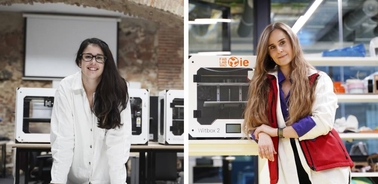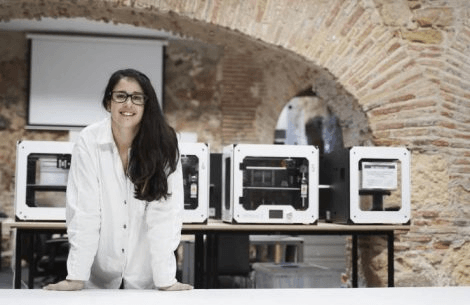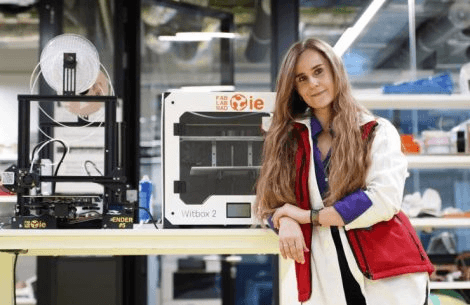A Community of Makers and Digital Artisans Led by Women at IE FabLab

We spoke with María Elena Cardiel and Lorena Delgado, the two women who run the FabLabs at the Segovia and Madrid campuses respectively.
Both agree unanimously on the two things that make these spaces unique: the magic of the learning by doing methodology; and the community of makers created in them that generates and shares knowledge around the world.
María Elena and Lorena have always been attracted to technology, and say a world of possibilities opened up for them when they discovered the field of digital fabrication. “The leap from designing, digitally or manually, to the fabrication of objects and models is something we never imagined as students. Thanks to the digital fabrication tools available to us we can prototype, visualize and simulate specific or general aspects of our designs. And little by little it turns us from being mere designers on paper to being digital artisans or makers,” explains Lorena.
“It is the cultural and industrial revolution of do it yourself (DIY). It is comprised of people who, supported by publicly available digital tools, technology and innovation, and following open source and open data philosophies, share their experiences and knowledge with the community, based on learning by doing.”
María Elena Cardiel, Manager of the IE FabLab at the Segovia Campus
 Elena Cardiel, Manager of the IE FabLab at the Segovia Campus. Photo Credit: Roberto Arribas
Elena Cardiel, Manager of the IE FabLab at the Segovia Campus. Photo Credit: Roberto ArribasAsked to describe the makers community in a few words, María Elena says: “It is the cultural and industrial revolution of do it yourself (DIY). It is comprised of people who, supported by publicly available digital tools, technology and innovation, and following open source and open data philosophies, share their experiences and knowledge with the community, based on learning by doing.” Lorena adds: “For me, the makers community is a group of digital artisans who create and share their designs and skills freely and indiscriminately.”
IE School of Architecture and Design’s Fab Lab has been a member of the global FabLabs network since 2019. The accreditation means IE’s Fab Labs, created for students, academics, scientists and researchers from all over the world to exchange their knowledge, is part of a worldwide platform spanning more than 70 countries. According to María Elena, being part of this international network means that “you can manufacture a project here in Segovia, for example, that has been developed in Kamakura (Japan)”.
In March 2020, as the pandemic started, IE School of Architecture and Design used 3D printers to make the frames for protection screens used by healthcare personnel in the central Spanish region of Castilla y León. This rapid response to the crisis was part of the Coronavirus Makers Initiative, made up of more than a hundred individuals from the province of Segovia. They coordinated the production of a model approved by the authorities and this response became an example of how established and coordinated this community was.
 Lorena Delgado, Coordinator of the IE FabLab at the Madrid Campus. Photo Credit: Roberto Arribas
Lorena Delgado, Coordinator of the IE FabLab at the Madrid Campus. Photo Credit: Roberto ArribasFor the two FabLab Managers, the best part of their jobs is seeing how free and collaborative knowledge enriches lives and allows society to move forward, not only from a technological point of view: "It is very rewarding to see students come to the workshops to learn how some technology, technique or material works, and suddenly you see in their faces that something clicks and their minds start to work, to imagine, to devise and to understand the world of possibilities that lies before them", explains María Elena. They insist the FabLab is not only just about technology: “It is very enriching to help and assist students with the ideas and problems they encounter in their projects and models. It doesn't matter how many machines or how much technology a Fab Lab has, the important thing is the community of designers and architects that is generated around that space of creation and fabrication,” adds Lorena.
She remembers an incident from the very early days of the Madrid FabLab: “A few months after setting up the Madrid Fab Lab, a design class was busily making their prototypes. Everything was a bit chaotic and noisy, but it worked. Suddenly, the power went off. All the machines stopped and there was no electricity. As we tried to figure out why the power had been interrupted, the students reacted quickly. They had to keep making their parts and make the best use of their time. So, they changed their power tools or machines for hand tools, and started using the flashlights on their smartphones to help each other. At that moment, I realized that the Fab Lab is not about machines, but instead about people who give life and meaning to this space by working together”.
“That's why the Maker community is so important, it’s a support group of digital artisans who help each other, share our mistakes and successes to correct and improve them; it’s also a place where global humanity is palpable regardless of the physical distances between us.”
Lorena Delgado, Coordinator of the IE FabLab at the Madrid Campus
Asked about gender imbalance in the field of fabrication, both said they had never experienced bias against women. María Elena explained she was encouraged when she was growing up to study whatever she wanted, and once digital fabrication appeared in her life, she was fully supported by the Maker community and the IE family. For both, digital fabrication and the use of machines frees them and opens them to any challenge or format. “It empowers us, gives us self-confidence and helps us explore our skills and efforts to the fullest. In general, digital manufacturing is not yet very visible, not because of gender issues, but because of fears that technologies will make us completely lose the humanity of the designs and projects we create. But, we are afraid to explore the unexplored and to make mistakes on the first try. But we are not alone. That's why the Maker community is so important, it’s a support group of digital artisans who help each other, share our mistakes and successes to correct and improve them; it’s also a place where global humanity is palpable regardless of the physical distances between us. The best thing we can do is to maintain this relationship with the community and make the most of the possibilities offered by technological improvements while still using manual tools”, Lorena concludes.